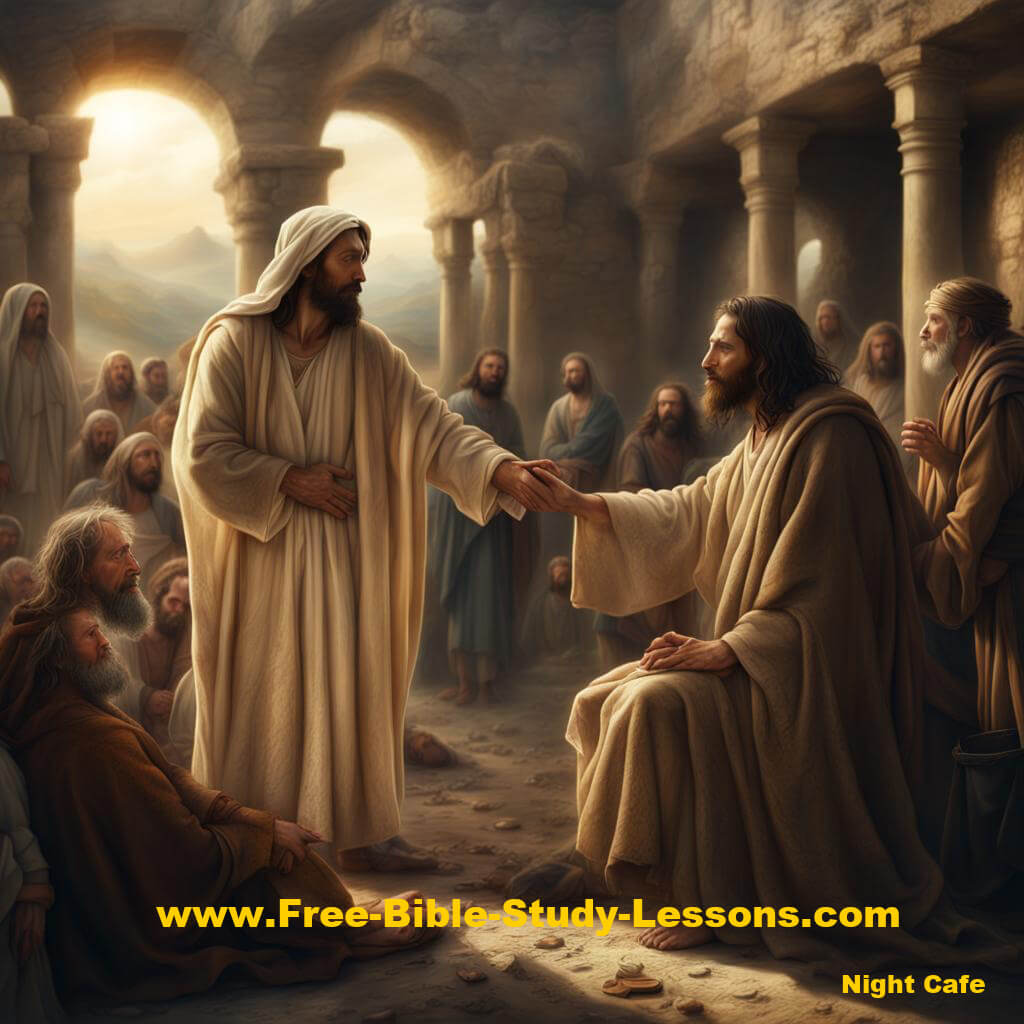| site search by freefind |
- Home
- Bible Prophecy
- This Generation
[If you purchase anything on this site, I may make a commission. Disclosure Policy]
Matthew 24:
Unraveling the Mystery of 'This Generation'
Our view of the End Times teaching of Matthew 24 will be defined by how we view one verse. That’s right. No matter what interpretation we put on the events described in this chapter, we will run up against this one verse and have to explain it. The verse is quite simple if we take a literal view of Scripture. However, if we have already decided what the preceding verses mean, then this verse may pose a problem.
What is this verse? Looking at different translations can throw light on the meaning of verses as we examine how different qualified translations handled the original languages. So let’s look at a few different translations of this troublesome verse.
Sitemap -
Newsletter -
Statement Of Faith -
Donate
Follow us on social media for daily Scripture comments and more at MeWe, Facebook or YouTube.

Truly I tell you, this generation will certainly not pass away until all these things have happened. Matt. 24:34, NIV
Truly I say to you, this generation will not pass away until all these things take place. Matt. 24:34, NASB
Verily I say unto you, This generation shall not pass, till all these things be fulfilled. Matt. 24:34, KJV
Truly, I say to you, this generation will not pass away until all these things take place. Matt. 24:34, ESV
As you can see, the translators of various versions of the Bible all translate this verse the same way. The New Century Version makes it very clear:
I tell you the truth, all these things will happen while the people of this time are still living.
What Is A 'Generation?'
What did Jesus mean by the word ‘Generation’? This is an essential question because it will tell us when the preceding signs will occur. Let’s look at what this verse means, and then we will look at how people have tried to evade its meaning to keep their Bible Prophecy theories intact.
The word “generation” can mean different but related things in various contexts. It can mean a period of time, an age, all the people living at a particular time, etc. As always, it is the context which determines the exact meaning. Our verse specifically states, “This generation.” The term “this generation is used 19 times in Scripture.
The First Mention
Let’s look at some of these:
The first time this word combination is used is in Genesis 7:1, where it says,
Then the Lord said to Noah, “Go into the ark, you and all your household, for I have seen that you are righteous before me in this generation.” ESV
God was bringing judgment on the people alive at the same time as Noah. It was not people in the past or the future who were condemned to a watery death. It was Noah’s contemporaries.
So, the first time this term is used, it definitely refers to the people alive when it was spoken.
How Jesus Used 'This Generation'

Jesus is the One Who used this expression the most often. Let’s turn to the New Testament and see how He used it. How Jesus used the term elsewhere will be critically important in determining how He used the term in Matthew 24.
But to what shall I compare this generation? It is like children sitting in the marketplace and calling to their playmates…”. Matt. 11:16, ESV [Also see Luke 7:31]
Jesus is criticizing the people alive as He is speaking [I.e. His generation] for not accepting the truth. If we doubt this, Jesus specifically mentions John the Baptist and Himself as the ones being rejected [Matt. 11:18-19]
The men of Nineveh will rise up at the judgment with this generation and condemn it, for they repented at the preaching of Jonah, and behold, something greater than Jonah is here. The queen of the South will rise up at the judgment with this generation and condemn it, for she came from the ends of the earth to hear the wisdom of Solomon, and behold, something greater than Solomon is here.” Matt. 12:41-42, ESV
Jesus uses our term twice. Both times, it is about the generation alive as He was speaking, rejecting Him despite having greater evidence than anyone in the past had.
When the crowds were increasing, He began to say, “This generation is an evil generation. It seeks for a sign, but no sign will be given it except the sign of Jonah. For as Jonah became a sign to the people of Nineveh, so will the Son of Man be to this generation. The queen of the South will rise up at the judgment with the men of this generation and condemn them, for she came from the ends of the earth to hear the wisdom of Solomon, and behold, something greater than Solomon is here. The men of Nineveh will rise up at the judgment with this generation and condemn it, for they repented at the preaching of Jonah, and behold, something greater than Jonah is here.” Luke 11:29-32, ESV [Also see Mark 8:11-12]
Jesus uses our term four times in this speech. Examine the context. The Pharisees [Mark] and the people wanted a sign that Jesus was the Messiah, as if the miracles He did were not enough. Jesus plainly tells them - people He is looking at face-to-face - that He will not give them a sign except for Jonah’s prophetic three days in the belly of the great fish. He tells them that people who believed on much less evidence will condemn them in the day of judgment. Is there any legitimate doubt that Jesus refers to people alive as He speaks?
“But first He must suffer many things and be rejected by this generation.” Luke 17:25, ESV
Jesus was speaking of when the Kingdom of God would come. He told His listeners that before it came, He would be rejected. What generation rejected Jesus? The generation of Jews then alive that had Him crucified! Could Jesus possibly be talking about any other generation?
It should be evident that every single time that Jesus used the term ‘this generation’ outside of Matthew 23 and 24 [and its companion passages], it refers to the people alive at the same time He was. Not only that, but Jesus was also explicitly talking about the generation of Jews experiencing His earthly ministry.
Matthew 23 & 24
Let’s look at this term as it is used in Matthew 23 and 24. Remember that there must be overwhelming evidence for us to consider that Jesus is using this term differently than He did in His other conversations.
“Truly, I say to you, all these things will come upon this generation.” Matt. 23:36, ESV [Also see Luke 11:50]
What things? Read the context. Jesus condemns the hypocritical religious rulers for their persecution of His people. He told them that all the righteous blood shed in the Old Testament period would be required of them. Right after this verse, Jesus mourns the destruction of Jerusalem, which happened in AD 70 to the generation of Jews alive when He was alive.
Then we have the verse in Matthew 24 quoted at the beginning. [Also see Mark 13:30 and Luke 21:32]
Every time Jesus uses the term ‘this generation,’ He is referring to the generation of Jews alive when He was alive. When He told them that all the signs mentioned in the first part of Matthew 24 would happen to ‘this generation,’ a plain, literal understanding would mean that the Jews then living experienced those signs.
Signs Vs This Generation

There are only three ways to balance these ‘signs’ with ‘this generation.’
1. Jesus meant that His generation would see these signs, but that didn’t happen, so He either lied or made a mistake from lack of knowledge. No Christian would take this view, but some non-Christians do.
2. These signs did not happen to the generation of Jews alive when Jesus was alive, so He must have meant something different when He said ‘this generation.’ The problem with views that take this stand [as we will see below] is that they must interpret what Jesus ‘meant’ while ignoring what He actually said. This is dangerous, as then Jesus can be made to represent any desired viewpoint; after all, I know what He meant!
3. These signs did happen to the generation of Jews alive when Jesus was alive. Jesus knew what He was talking about and said exactly what He meant. These signs are based on well-known and well-established Old Testament prophetic language.
As I am sure you have guessed, I take option number three. The popular futurist view takes option number two. So how do the futurists try to get around the plain, literal meaning of ‘this generation?’ There seem to be three primary ways they attempt it.
Three Ways To Avoid The Literal Meaning
1. The word ‘Generation’ refers to the evil generation.
“You will see that Jesus did not refer to a physical generation but an evil, spiritual generation... a single spiritual generation which spans centuries and millenniums, from Cain to the present day…. the spiritual offspring of Satan who are ruled by what the book of Revelation calls Jerusalem, the great harlot.” Jim Phillips

As I understand it, this theory states that there are two spiritual “generations”: the children of God and the children of Satan. When Jesus said “generation” in Matthew 24, He was not referring to a physical generation - the people He was talking to - but to the evil generation that has existed since the murder of Abel.
Then, what Jesus “meant” in Matthew 24:34 was that the satanic evil generation, which has existed for thousands of years, would not pass away until the preceding verses were fulfilled. To me, this makes the saying of Jesus meaningless. No one that I know of expects the line of evil people to be destroyed before the return of Christ, so, of course, anything that happens before the return of Christ would happen before the ‘evil generation’ passes away.
2. The word ‘Generation’ refers to the Jewish race.
This theory states that the word ‘generation’ can mean ‘race’; therefore, Jesus meant that the Jewish race would not pass away before all these signs happened. To me, this falls into the same problem as Number One since no one expects the Jewish race to pass away before the return of Christ. The words of Jesus become meaningless.
3. The word ‘Generation’ refers to the people who are alive when these things begin to happen.
Of these three theories, this one makes the most sense; as far as I can tell, it is the most popular. In this view, Jesus is not talking about the generation He was living in but the generation in the future when these things happened. He was saying that when [in the future] these things began to happen, they would be completed within a generation. This is one reason why Bible Prophecy experts [since proven wrong[ thought Jesus would return within 40 years of Israel becoming a nation.
The Two Weaknesses
All three of these theories have at least two weaknesses.
1. They all start with the assumption that what Jesus said in Matthew 24:1-33 has yet to happen. They talk about interpreting Verse 34 in its context, which is vital, but they define the context according to preconceived ideas instead of letting the Scripture speak for itself. The reasoning is something like this: Since Matthew 24 talks about the End Times, then Jesus cannot have meant His generation. But the opposite is also true. If Jesus means His generation, then Matthew 24 is not talking about the End Times as popularly conceived.
2. All these theories try to interpret what they think Jesus meant instead of accepting what He actually said. Jesus could have easily said any of the above, but the fact is that He did not. Even most non-Christians will admit that Jesus was a great teacher/communicator. If Jesus had intended to communicate any of the above ideas, He would have.
Some object by saying that the word ‘generation’ does not always refer to the generation alive when Jesus spoke. That is true. The context always determines which generation is being spoken of. But the fact is whenever we see the words “ this generation” or “this evil generation” in the New Testament,” it is constantly referring to the generation then alive, as we have shown above.
Please don’t take my word for it or anyone else’s word. Study the Scriptures for yourself.
If you are interested in what Matthew 24 means when considered in context, we have a couple of free courses on that topic. Check them out on our Bible Study Page.

Follow us on social media for daily Scripture comments and more at MeWe, Facebook or YouTube.
Sitemap -
Newsletter -
Statement Of Faith -
Donate
Sign up for our free monthly newsletter or take one of our free Bible Study courses.
Please note: We no longer have the commenting feature [maybe again in the future]. Joshua Institute students who have questions or comments on their courses can use the contact button and mention the course name and lesson number in the email. Thank you. Glenn

Privacy - Disclosure
